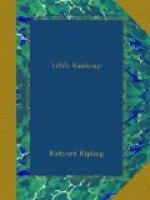Unluckily he did not observe that three miles to his right flank a flying column of Northern horse with a detachment of Ghoorkhas and British troops had been pushed round, as fast as the failing light allowed, to cut across the entire rear of the Southern Army, to break, as it were, all the ribs of the fan where they converged by striking at the transport, reserve ammunition, and artillery supplies. Their instructions were to go in, avoiding the few scouts who might not have been drawn off by the pursuit, and create sufficient excitement to impress the Southern Army with the wisdom of guarding their own flank and rear before they captured cities. It was a pretty manoeuvre, neatly carried out.
Speaking for the second division of the Southern Army, our first intimation of the attack was at twilight, when the artillery were labouring in deep sand, most of the escort were trying to help them out, and the main body of the infantry had gone on. A Noah’s Ark of elephants, camels, and the mixed menagerie of an Indian transport-train bubbled and squealed behind the guns when there appeared from nowhere in particular British infantry to the extent of three companies, who sprang to the heads of the gun-horses and brought all to a standstill amid oaths and cheers.
‘How’s that, umpire?’ said the major commanding the attack, and with one voice the drivers and limber gunners answered ‘Hout!’ while the colonel of artillery sputtered.
‘All your scouts are charging our main body,’ said the major. ’Your flanks are unprotected for two miles. I think we’ve broken the back of this division. And listen,—there go the Ghoorkhas!’
A weak fire broke from the rear-guard more than a mile away, and was answered by cheerful howlings. The Ghoorkhas, who should have swung clear of the second division, had stepped on its tail in the dark, but drawing off hastened to reach the next line of attack, which lay almost parallel to us five or six miles away.
Our column swayed and surged irresolutely,—three batteries, the divisional ammunition reserve, the baggage, and a section of the hospital and bearer corps. The commandant ruefully promised to report himself ‘cut up’ to the nearest umpire, and commending his cavalry and all other cavalry to the special care of Eblis, toiled on to resume touch with the rest of the division.
‘We’ll bivouac here to-night,’ said the major, ’I have a notion that the Ghoorkhas will get caught. They may want us to re-form on. Stand easy till the transport gets away.’
A hand caught my beast’s bridle and led him out of the choking dust; a larger hand deftly canted me out of the saddle; and two of the hugest hands in the world received me sliding. Pleasant is the lot of the special correspondent who falls into such hands as those of Privates Mulvaney, Ortheris, and Learoyd.
‘An’ that’s all right,’ said the Irishman calmly. ’We thought we’d find you somewheres here by. Is there anything av yours in the transport? Orth’ris ‘ll fetch ut out.’




